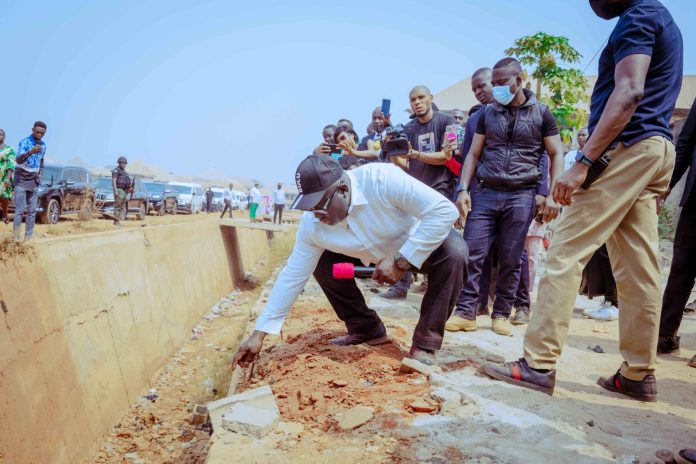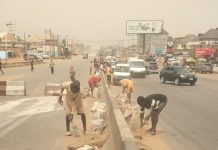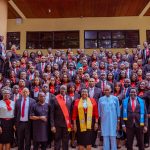By Kenneth Orusi
The administration of Rt. Hon. Sheriff Oborevwori, Governor of Delta State promised to prioritize infrastructure development and economic growth.
However, the effectiveness of this vision is being threatened by the glaring incompetence of some of the aides assigned to project monitoring.
It is, to say the least, laughable that Governor Oborevwori appointed a supposedly competent civil engineer as the Special Adviser for Project Monitoring and Audit, along with a strong team of project monitors, to ensure compliance.
While it could be argued that Oborevwori is committed to ensuring value for the funds allocated to projects and is opposed to cutting corners, the widespread use of substandard materials for projects has now become the norm.
These individuals, entrusted with the critical task of ensuring quality and timely execution of state projects, particularly roads and other critical infrastructure have fallen short of the expectations required to achieve the administration’s goals.
Project monitoring is the backbone of successful governance, especially in states like Delta, where infrastructure plays a vital role in economic and social development.
Yet, the performance of these aides has raised serious concerns. Several infrastructural projects, including roads and the commissioned High Court Complex remain a reference point, plagued by delays and maybe substandard execution.
This inefficiency has resulted in wastage of public funds and an erosion of public trust in the government’s ability to deliver on its promises.
The viral videos of the Governor rejecting projects with the most recent in Achalla -Ibusa, using a cutlass to test the quality of infrastructure, including drainages, highlight the inefficiency of these lazy political appointees.
These aides, who hop from one project site to another in a theatrical display of sycophancy to gain attention, remain disconnected from the realities on the ground.
With due respect, growing up, the term “Isoko Tolopia” was often used to describe the war-war nature of the people from the Isoko nationality in Delta South Senatorial District.
In recent times, Oborevwori has often been seen wielding cutlasses during project inspections, perhaps redefining “Isoko Tolopia” as “Oborevwori Tolopia.”
This shift reflects a troubling trend where appointments are no longer based on merit but are instead handed out as political compensation to individuals who either supported or defected from opposition parties during elections.
One major issue is the apparent lack of expertise among the aides. Project monitoring demands technical knowledge, managerial skills, and the ability to enforce accountability among contractors.
Unfortunately, many of these aides seem ill-equipped to meet these demands. Reports of shoddy construction, abandoned projects, and contractors flouting deadlines suggest a lack of proper oversight.
Their inability to effectively monitor and report progress is costing the state valuable time and resources.
Additionally, there appears to be a troubling lack of transparency and accountability in project monitoring.
Instances of upward reviews of contracts (budgets), unapproved alterations to project designs, and unexplained delays have been attributed to the negligence of these aides.
It raises the question: are these failures a result of incompetence, or are they deliberate acts to serve personal interests?
Governor Oborevwori must also share part of the blame for this growing crisis. The responsibility of appointing competent individuals lies squarely with the governor.
By prioritizing political loyalty over merit in appointing aides and project monitors, he has inadvertently jeopardized the efficiency of his administration’s development agenda.
The governor must remember that the success of any government lies not only in lofty promises but in tangible achievements delivered through capable hands.
The consequences of these inadequacies extend far beyond abandoned projects.
Delta State’s reputation as an investment destination is being undermined by the perception of inefficiency and corruption.
Potential investors are likely to shy away from a state where governance appears disorganized and infrastructure development lacks integrity.
Although, on Thursday January 16, 2025, Oborevwori, reaffirmed that his administration’s top priority is delivering quality projects that provide value to the people, irrespective of personal relationships, to address these issues, he must act decisively.
First, he needs to conduct a thorough review of the performance of his aides.
Those found wanting in competence and commitment should be replaced with professionals with proven expertise in project management.
Secondly, the state should adopt modern project monitoring tools, such as digital dashboards, to track real-time progress and enhance transparency.
Finally, a strict accountability framework must be established to ensure that aides and contractors adhere to project timelines and quality standards.
The people of Delta State deserve better. They deserve a government that prioritizes their welfare by ensuring that public projects are delivered efficiently and effectively.
Governor Oborevwori still has the opportunity to salvage the situation by making the tough but necessary decisions to overhaul his project monitoring team.
Anything short of this risks derailing his administration’s development agenda and further alienating the citizens who placed their trust in his leadership. Delta State’s future depends on decisive action today.
The governor must rise to the occasion and ensure that those entrusted with monitoring projects are equipped and committed to driving the state towards progress.
Kenneth Orusi, is the Publisher and Editor-in-chief of The Story and Chairman, ICC, Delta NUJ.

















